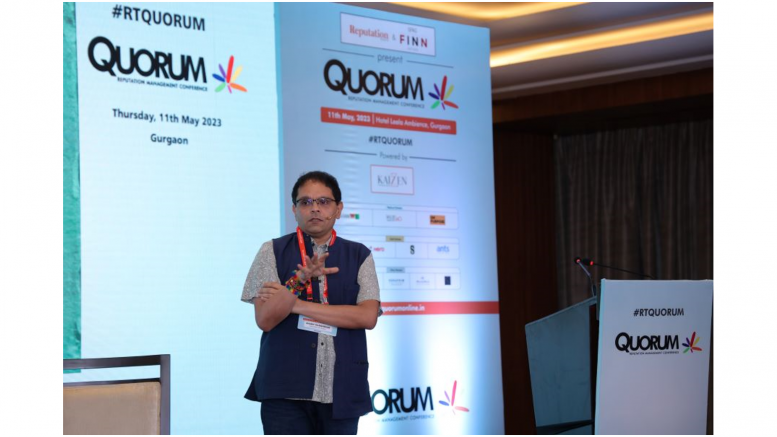Inclusion is a culture issue underlined Sharif D Rangnekar as he spoke about Diversity & Inclusion at the Workplace, as he brilliantly gave his unique perspective on the role of #queer, #dalits and #women in the media, cinema and PR industry at #RTQUORUM. In fact, he wears many hats – that of a writer, curator, singer-songwriter and gay rights activist.
“Equality today means becoming equal to a man. But why? We need to deconstruct this idea,” insisted Sharif. It’s difficult to keep to a script, and it is so disturbing seeing the disregard of so many groups, he added.
In fact, he felt it worked out to – “caricaturisation of a large community. When you are including people into the workplace, you are including everything. It took me to the age of 50, to feel I am legit…and most of my life is gone!”
Recalling the time when his book was released he said that he was in a sad state – he went into depression. “For the longest time I felt I’ve failed, I did not think the outer system did!”
What was his exclusive take? We have religion, caste, which are intertwined in the Indian system. We have statements behind every successful man. Men talk like they’ve invaded the world! All these notions create the culture. “The male lens sucks!” he exclaimed. And school education is also not good enough. We aren’t told about Shikhandi in Mahabharat, Krishna, the Upanishads etc while studying at school. We’ve been conditioned to believe in a distorted picture, which is far from reality. And he seriously questioned – Who is progressive and who is not? What kind of culture are we creating? One feels alienated, disempowered, rootless, with no belonging, depressed, suicidal. “When I was in school, in Class 8, I went through a time when I thought about taking on death,” he said, sharing a grim picture.
Still, the freedom to express gender choices without any boundaries remains a constant struggle for the LGBTQ+ community. The Indian urban population today, has participated in increasing awareness of LGBTQ+ rights – through social media and events. Still, it only represents a small part of their immense, diverse challenges.
Another reality that he put the spotlight on was that – more than half of the gay community have considered suicide! 75 percent fear verbal or physical abuse. Only 21 per cent in senior positions are fully ‘open’. 57 per cent feel it has slowed down their progress. Quite shocking, literally.
At the end of the day, “it’s about – empathy”, he stated. The ability to listen, to understand that all lived experiences are not the same nor are the solutions. Equality is not always the answer, equity should be considered. The meritocracy is applicable in an equal world. Remember, you could be a parent, your child could be a queer!
His talk was a reflection of his book – where there is a call for strength – to put it in his own words – “to make it through thick and thin, to be odd and use that oddity as a force in itself”.
In a dialogue with Arpana Ahuja, Head Corporate Communications and Brand, Shell India the question came up – what is the difference between diversity, inclusiveness and belonging? And pat came his answer – Diversity and inclusiveness don’t mean anything, if you don’t feel you belong! “The choices have to expand beyond the patriarchal system, which have forced men to behave in a certain way”, was his clear take.
The views and opinions published here belong to the author and do not necessarily reflect the views and opinions of the publisher.






Be the first to comment on "Diversity at the workplace"